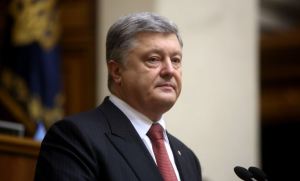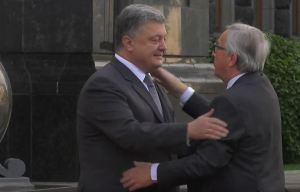nsnbc : The European Union insists on the need to create a separate anti-corruption court in Ukraine and is ready to help in selecting judges, according to a letter sent by the EU Delegation to Ukraine in response to the Ukrainian news outlet Europeiska Pravda’s request about the EU’s position on the anti-corruption court after the Venice Commission published its conclusion.
 The European Union (EU) made a U-turn with regard to separate anti-corruption courts in Ukraine. In July 2017 EU Commission President Jean-Claude Juncker dropped the demand that the Ukraine establish an independent anti-corruption court.
The European Union (EU) made a U-turn with regard to separate anti-corruption courts in Ukraine. In July 2017 EU Commission President Jean-Claude Juncker dropped the demand that the Ukraine establish an independent anti-corruption court.
The demand was a precondition for both EU and IMF funds for Ukraine. The National Anti-Corruption Bureau of Ukraine (NABU) and an alliance of other NGOs, on July 13 – 14, issued statements blasting European Commission President Jean-Claude Juncker for backtracking on the demand.
The EU now made a second U-turn and notes that the Venice Commission’s conclusion is very important in the context of further modernization of Ukraine and contains a useful clarification of European standards of the creation of specialized anti-corruption judicial bodies. The Venice Commission has invited Ukrainian President Petro Poroshenko to promptly submit his own draft law on anti-corruption courts that will be based on the Venice Commission’s recommendations.
According to the EU, a high specialized anti-corruption court should be created as an institution that is independent and separate from the existing structure of the judiciary. And vice versa, the introduction of this court into the existing structure of the judiciary by appointing specialized judges in all general local courts, appellate and supreme courts cannot be justified or applied in practice, considering the current legislation and Ukraine’s international obligations regarding the creation of a specialized anti-corruption court.
The EU also welcomed the intention of Ukrainian President Petro Poroshenko to create an anti-corruption court that would meet the standards of the Council of Europe. At the same time the EU expressed its readiness to assist the Ukrainian authorities in creating the high specialized anti-corruption court, which would be in line with the Venice Commission’s conclusions.
The EU says that the independence, integrity and professionalism of all judges who will be appointed to the anti-corruption court will be crucial for restoring public confidence in the authorities, and the EU is ready to promote transparency in the selection of judges if necessary.
The creation of the high anti-corruption court as part of judicial reform is stipulated by the law on the judicial system and the status of judges adopted by the Verkhovna Rada (Ukrainian parliament in Kiev) on June 2, 2016.
On February 1, 2017, bill No. 6011 on anti-corruption courts drafted by MP Yehor Sobolev of the Samopomich parliamentary faction, nonaligned Oksana Syroyid, and Svitlana Zalishchuk, Serhiy Leshchenko, Mustafa Nayem (all from the Petro Poroshenko Bloc faction), and Ivan Krulko of the Batkivshchyna faction was registered in the Verkhovna Rada.
This bill defines the peculiarities of the organization of anti-corruption courts. It also contains special requirements for judges of anti-corruption courts, and defines the requirements for the organization of anti-corruption courts, for candidates for positions of judges of anti-corruption courts, for the selection and procedure of these judges’ appointment.
According to Sobolev, the high anti-corruption court is designed to consider cases investigated by the National Anti-corruption Bureau of Ukraine (NABU) and the Specialized Anti-Corruption Prosecutor’s Office.
The High Council of Justice on March 9, 2017, issued an advisory opinion, stating that bill No. 6011 on anti-corruption courts contradicts the Constitution and is not consistent with a number of legislative acts. On June 22, Parliament Speaker Andriy Parubiy announced he would send two anti-corruption court concepts to the Venice Commission.
The Venice Commission later said in its conclusion that the key components of the No. 6011 draft law should be maintained, namely the establishment of an independent high anti-corruption court and appeal instance whose judges are of impeccable reputation, adequately protected and are selected on a competitive basis in a transparent manner.
“Temporarily, international organizations and donors active in providing support for anti-corruption programmes in Ukraine should be given a crucial role in the body competent for selecting specialized anti-corruption judges, similar to the role envisaged for them in draft law No. 6011.
The international involvement seems to be justified in the specific situation in Ukraine, with due regard to the principle of Ukraine’s sovereignty,” it said. The Venice Commission also examined an alternative bill, the draft law of Ukraine on the introduction of mandatory specialization of judges to consider corruption offenses (draft Law No. 6529).
“The draft deviates from the current law and international obligations of Ukraine to set up a specialized anti-corruption court. The Commission cannot see how the appointment of specialized judges in all courts in Ukraine could be justified and be implemented in practice. It appears questionable, the Venice Commission stresses, whether the referral of all kinds of corruption-related offenses to the specialized judges would be an effective tool for enhancing the fight against high-level corruption in particular,” it said.
CH/L – nsnbc 10.10.2017
Source Article from https://nsnbc.me/2017/10/10/86585/
 RSS Feed
RSS Feed















 October 10th, 2017
October 10th, 2017  Awake Goy
Awake Goy 











 Posted in
Posted in  Tags:
Tags: 













